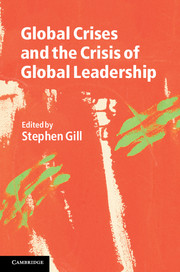Book contents
- Frontmatter
- Contents
- Contributors
- Acronyms
- Acknowledgements
- Introduction: global crises and the crisis of global leadership
- Part I Concepts of Global Leadership and Dominant Strategies
- Part II Changing Material Conditions of Existence and Global Leadership: Energy, Climate Change and Water
- 4 The crisis of petro-market civilization: the past as prologue?
- 5 Global climate change, human security and the future of democracy
- 6 The emerging global freshwater crisis and the privatization of global leadership
- Part III Global Leadership Ethics, Crises and Subaltern Forces
- Part IV Prospects for Alternative Forms of Global Leadership
- Glossary
- Bibliography
- Index
6 - The emerging global freshwater crisis and the privatization of global leadership
from Part II - Changing Material Conditions of Existence and Global Leadership: Energy, Climate Change and Water
Published online by Cambridge University Press: 05 June 2012
- Frontmatter
- Contents
- Contributors
- Acronyms
- Acknowledgements
- Introduction: global crises and the crisis of global leadership
- Part I Concepts of Global Leadership and Dominant Strategies
- Part II Changing Material Conditions of Existence and Global Leadership: Energy, Climate Change and Water
- 4 The crisis of petro-market civilization: the past as prologue?
- 5 Global climate change, human security and the future of democracy
- 6 The emerging global freshwater crisis and the privatization of global leadership
- Part III Global Leadership Ethics, Crises and Subaltern Forces
- Part IV Prospects for Alternative Forms of Global Leadership
- Glossary
- Bibliography
- Index
Summary
Summary
This chapter deals with a key component of global crisis: the nature of, access to and the multifaceted laws and policy perspectives governing the use of global freshwater. Its focus is also on the global leadership strategies and struggles concerning access to a vital resource for human survival. This struggle involves global market forces and civil society movements. It concerns issues of environmental justice and human security. On the one hand, neoliberal free market principles and new constitutional forms of international economic and trade law have led to the treatment of vital resources such as water as saleable ‘commodities’. On the other hand, numerous civil society organizations and human rights lawyers argue that access to drinking water should be a fundamental human right. This chapter argues for an approach to water governance that treats water as a fundamental human right rather than simply as a commodity that is best governed by private corporations and market forces.
Introduction: freshwater scarcity
This chapter explores some of the legal, political and economic structures and processes that are shaping leadership strategies for addressing the emerging global freshwater crisis. It discusses international water laws, control over the market for freshwater supply and the various political forces shaping global water policies. It addresses these questions not simply from the viewpoint of the efficient allocation of water as a commodity but, more fundamentally, as a question of access to water from a human rights perspective. This clash of perspectives will shape the future governance of global freshwater supply in coming years.
- Type
- Chapter
- Information
- Global Crises and the Crisis of Global Leadership , pp. 107 - 124Publisher: Cambridge University PressPrint publication year: 2011



